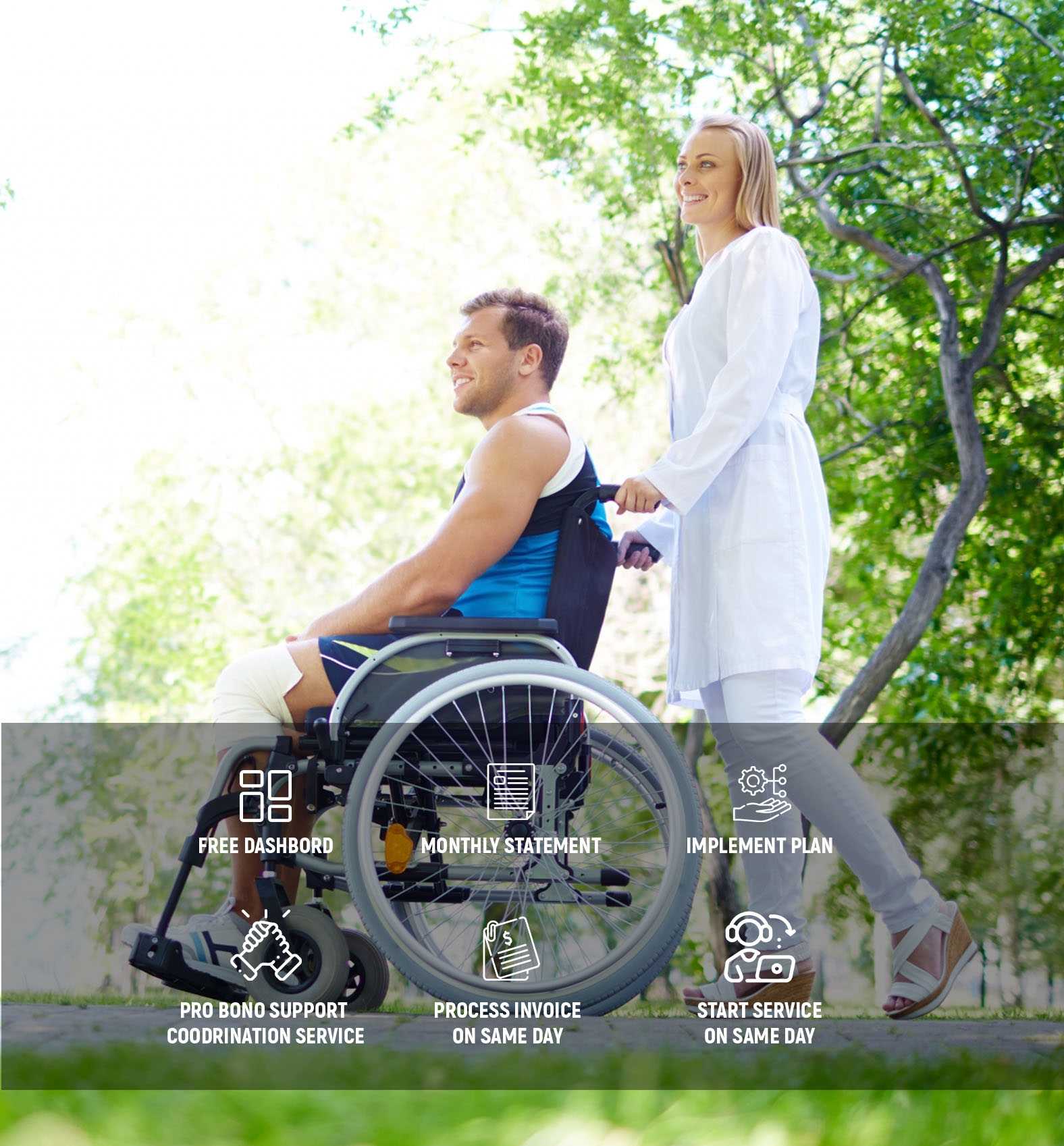What is a support worker?
As an NDIS participant, you are free to choose and employ your support worker to help navigate your NDIS plan. A support worker can help you have a more accessible, safer, and more fulfilling life. Support workers are skilled professionals in their field and usually come from various economic and cultural backgrounds. They can assist you in your NDIS journey and make solid progress in reaching your NDIS goals.
Your support worker will become an integral part of your team and will be a valuable source of information, experience and knowledge. While you want to choose a support worker who is skilled and professional, you also want to make sure you can work well together and potentially build a relationship.

When you choose your support worker for your NDIS plan, it is important that you select someone who is comfortable with your disability and who can be available for at least a year.
Support workers are flexible; they are kind of like the Swiss army knife of your support team.
Here are some common types of services that a good support worker will be able to help you with:
- Everyday housework
- Personal hygiene and personal care
- Personal finance and record-keeping
- Income budgeting
- Communicating with other people on your behalf if you’re unable
- Making friends and joining in community activities
- Transport arrangements
- Helping learn new skills such as sports or computers
- Meals, food preparation and shopping
- Confidence building
- Conversation abilities
- Playing video or board games
- Improving the daily quality of life
- Helping find education or work opportunities
- Help with talking to strangers or people in official positions
- Going on day trips and activities

With such a broad range of activities, a support worker might help you with it’s essential to look for good qualities when choosing one.
What qualities should you look for when hiring an NDIS support worker?
What makes a good support worker is often entirely up to the individual. Everyone is different, and we all have people we get along with more than others. Before choosing a support worker, make a list of some qualities that are important to you. Thinks about things like
- Are they personable - likes talking with people and is a good listener.
- Are they patient - doesn't get angry quickly, is supportive & understanding even despite the challenges that people with disabilities face.
- Are they confident and friendly - sure enough to ask questions and not afraid to challenge or question or be critical on their own?
- Are they flexible - able to work in whatever situation they require, whether at home or out and about.
- Are they physically capable - able to lift or move a person as needed?
- Are they respectful - will respect the privacy of the person and those around them and their opinions and ideas.
- Are they punctual - sticks to agreed schedules, times and appointments.
- Are they reliable - can be trusted not to abuse their position or the trust placed in them by the people they care for.
- Are they committed to the job - in it for the long haul, ready to help in any way needed?
- Are they honest about their strengths and weaknesses, does not take tasks beyond their capabilities or beyond what is required of them?
- Are they qualified and NDIS registered? It's not always a prerequisite for hiring someone who has a certificate to work in disability, but it helps.
- Do they have current police or working with children clearance?
- Do they have similar interests? If you are spending a lot of time with someone, it is nice to like some of the same things as you.
- Do they work for a service provider, or are they independent? Sometimes you can get better peace of mind by going through an NDIS registered service provider.
Once you have your list of important qualities that you want in your support worker, ask potential candidates if they meet these criteria before interviewing them.
Now that you have an idea of what a support worker can do and what qualities to look for, you need to find the right ones. That’s right; you probably want to pick more than one support worker depending on your needs. No one support worker will likely tick all of your boxes, and chances are they are not always available when you need them. It’s best to employ a couple or even a few support workers to ensure your needs are covered and you do not become too reliant on any one person.
How to choose a good support worker?
Activate your network
Ask a friend, family member or carer if they might be able to recommend one who can provide affordable care. The best type of marketing is word of mouth, so it will be better to get a recommendation rather than going through a website or advertising.
Go through an NDIS registered care provider
There are a lot of benefits of going through a provider, such as peace of mind. NDIS registered providers often put their support workers through an NDIS worker screening check, so you can be sure that they are trustworthy, competent and safe to work with. It will also let you know that they are hired professionally, which is essential for many people.

Put an advertisement out there and let a support worker choose you.
This can be a promising avenue if you don’t want to go through many different support worker profiles. Write an advertisement letting them know a little about yourself, your disability and what you are looking for in a support worker. This is a job ad, so you can be as specific as you want, and you can weed out any incompatible workers right from the start. Just be careful not to post too much personal information about yourself, such as an address, DOB etc.
Conduct Interviews
Once you have completed an application check on your list of potential support worker candidates, it’s time to sit down and have a chat. Think about where you want to spend time with each support worker and arrange for an interview at that location. For example, if you hire a support worker who will primarily be helping around the house, arrange to either interview there or for a tour after the first initial meeting. Likewise, if you want your support worker to help integrate into the community, meet in a public space like a cafe or library.
Interview Tips
- Tell me about yourself.
- Name one of your strengths.
- Why did you become a support worker?
- What is your working philosophy?
- What qualifications do you have?
- What is good customer service to you?
- Do you know any good jokes?
- Are there any aspects of care you are not willing to do? I.e. Toilet or bathing help?
- How will we communicate with each other and organise schedules? Email, phone or in person?
- Are they familiar with the care platforms you use? Such as invoicing and scheduling
- How long do you think you will be able to be my support worker?
- How would you handle an emergency if it arose?
- Did you bring your police check, and do you have a clean driving record?
- Do you have any allergies or medical conditions I should be aware of?
- Are you a dog or a cat person?
While you are asking these questions, it’s also good to get a feel for the candidate. Are they confident? Articulate? Do they seem nervous or gaffe-prone? Look at who you are interviewing and think about how these people will fit into your life. Don’t be worried about asking lots of questions; you’re the boss!
And remember, you are always in control with the NDIS. If you find that you and your support worker are not working out after a while, you can make arrangements to change.
One last thing – no matter how friendly people seem, always conduct a background screen check before committing to a support worker.

At My Care Plan Manager, we work with NDIS participants who want to get the most out of their NDIS funding. By choosing us for your plan management, we enable you to have the freedom of choice to select your supports. Just ask about switching to a plan manager at your next plan review or get in touch today.

